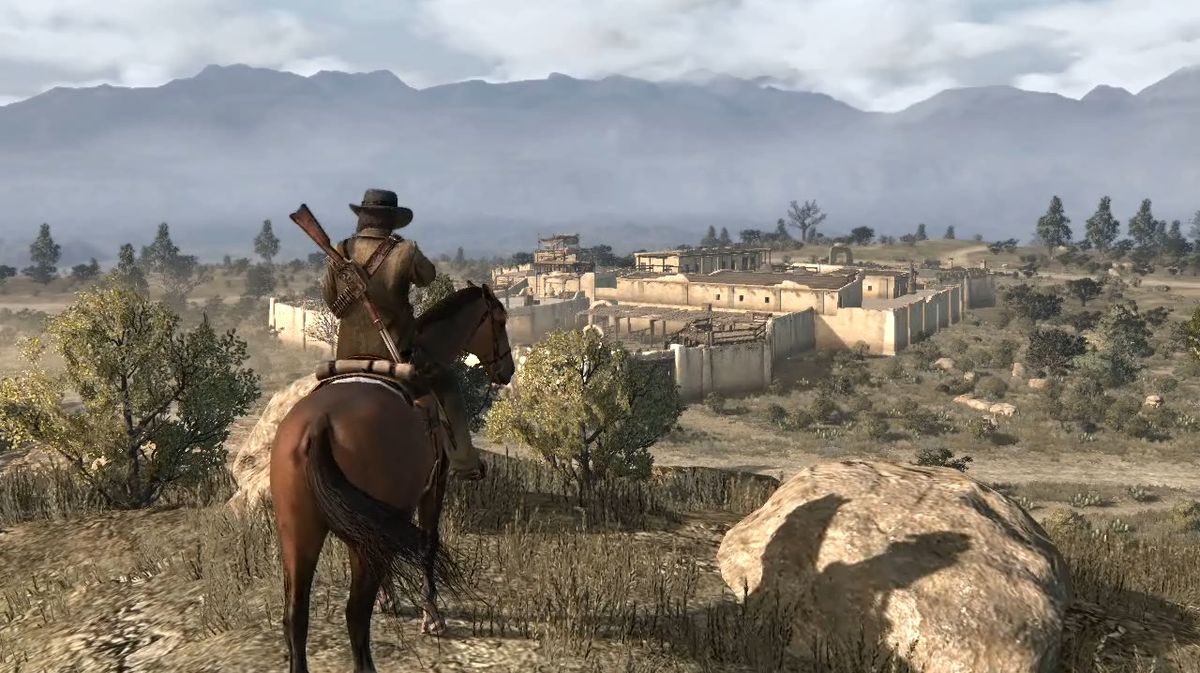A Classic of a Passing Generation

Every summer there is a week or two, usually after the end of internships and before the start of the school year, for which nothing is planned. It is during this time that I inevitably plunge back into binge-gaming, desperately marathoning any Games of the Year I missed out on due to school-time business.
This year, during that late-August recess, I found my catalogue surprisingly empty. None of this past year’s favorites called to me strongly. Sitting on my couch with nothing to do, and loathing the idea of actually doing something productive, I spied in my bookshelf a game that I hadn’t thought of for year: Red Dead Redemption.
I first played through Red Dead during a similar break, shortly after its release in the summer of 2010 and at some point in between high school and college. Returning to it after three years was an utter delight and speaks volumes to both the replay value of gaming masterpieces and the ability of works of art in general to change and evolve as we do.
Red Dead tells the story of John Marston, a former outlaw looking for, as the title suggests, redemption from his gunslinging past. Once a member of the notorious Dutch van der Linde Gang, Marston now looks to settle down on a ranch with his wife and son. It is through clever, slow and deliberate exposition that the player learns the details of Marston’s life. In conversation with a diverse cast of characters, Marson divulges over time that his family has been kidnapped by the U.S. government in order to coerce him into hunting down and bringing to justice the members of his old gang. The hunt for his former brothers-in-arms is the motivation that drives the plot forward, and provides justification for the game’s biggest action sequences.
But without spoiling too much, this classic old-West plot isn’t what makes the game shine and stand out as one of the greatest games of this generation. The final act of the game brings Marston’s story full-circle, giving meaning to each of his actions throughout and delivering a thoroughly satisfying ending like few others. If a game should have one selling point, Red Dead’s is almost certainly its final act.
This doesn’t mean that the game is only worth playing for its plot and writing. The general atmosphere of the game both complements the prior points and deserves mention on its own. The game is made by Rockstar, the company that brought us Grand Theft Auto and LA Noir; and in traditional Rockstar fashion, the game contains an open world that’s worth exploring.
The world comprises three regions, each with a real-world analog: New Austen may as well be Texas, Nuevo Paradiso is northern Mexico, and West Elizabeth is an amalgam of the Western Border States of the early 1900s. Each region boasts its own set of flora and fauna, as well as unique and often breathtaking landscapes. Nuevo Paradiso really steals the show here; riding past the region’s orange-tinted rock formations and through its white sand deserts is truly evocative of the classic Westerns I know and love.
Townspeople in New Austen speak with a Texas drawl and wear cowboy hats, while those in the metropolitan areas of West Elizabeth prefer bowler hats and suits. There is also a full range of activities to engage in outside of the main story, from hunting cougars and bears to horseshoes and blackjack. There’s even a way to cheat at a game of Texas Holdem; get caught and you’ll be challenged to a duel.
These minigames can be repetitive, but they’re a good excuse for completionists like myself to explore the world that the game’s designers so painstakingly crafted. Admittedly, at times some tasks could become boring or tedious. Riding across the Western wilderness for a long while, looking for a pair of cougars to chase down with a hunting knife was not always fun. But at least the game’s minimalistic and tasteful soundtrack, which chimed in perfectly at key plot points, kept me immersed in that old West ambiance.
It’s hard to explain what I like so much about Red Dead Redemption. It’s certainly hard to compare it to other games, like Dark Souls, that I’ve praised in the past. But there’s something about Red Dead which transcends expert execution and makes it, in my humble opinion, a masterwork of the medium – something which I wasn’t sensitive to back when I first played it in 2010.
I suppose that since then I’ve had some time to watch more movies, read more books, talk about them and develop some critical taste. Now I see more how Red Dead functions as a member of a corpus of tales and films centering on the old West. In its long and winding narrative, it embodies so many themes that are emblematic of the Western: the rebelliousness of youth and the romanticism of “the life,” the death of the Wild West at the hands of civilization, and the legacies that notorious men leave behind.
But what makes Red Dead stand out among these works is the interactive element. Being able to control the actions of John Marston, and more importantly control them outside of the central plot, immerses you in his life and his character more than possible in any other medium. Selling wolfskins at the Armadillo General Store to earn some extra cash for a new horse may seem like tedium to some, but to me it’s the difference between a good movie and a great game.





Comments ()